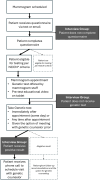Experiences across a genetic screening and testing programme pathway: a qualitative study of mammogram patient perspectives
- PMID: 39448212
- PMCID: PMC11499760
- DOI: 10.1136/bmjopen-2024-089884
Experiences across a genetic screening and testing programme pathway: a qualitative study of mammogram patient perspectives
Abstract
Background: Population-based genetic screening and testing programmes have substantial potential to improve cancer-related outcomes through early detection and cancer prevention. Yet, genetic testing for cancer risk remains largely underused. This study aimed to describe barriers and facilitators to patient engagement at each stage of a California-based genetic screening programme, from completing the electronic screener to receiving the test and to identify potential improvements that could support precision medicine-based approaches to patient care.
Methods: We conducted 26 semistructured interviews among programme participants who did not complete the screener (n=9), those who did not receive the recommended test (n=7) and those who received a genetic test (n=10). Interviewees were selected from patients who recently received a mammogram through one of the participating Southern California clinics. Interviews were transcribed and coded using Atlas.ti. The study used a qualitative descriptive approach to identify similar and contrasting themes among the participant groups.
Results: This study found that barriers and facilitators to engagement were largely the same regardless of how far participants had moved through the process towards getting a genetic test. We identified four overarching themes: participants wanted clear communication of personal benefits at each stage; participants needed additional information and knowledge to navigate genetic screening and testing; a trusted provider could be instrumental in participants following a recommendation; and repetition and timing strongly impacted participants' likelihood to engage.
Conclusions: Providing education about the benefits of genetic screening and testing to patients and their families, as well as clear communication about what each step entails may help patients engage with similar programmes. Strategies aimed at increasing coordination among a patient's healthcare team can also help ensure information reaches patients in multiple ways, from multiple providers, to increase the likelihood that recommendations for testing come from trusted sources, which supports the uptake of genetic testing.
Keywords: cancer genetics; mass screening; patient satisfaction; quality improvement.
© Author(s) (or their employer(s)) 2024. Re-use permitted under CC BY-NC. No commercial re-use. See rights and permissions. Published by BMJ.
Conflict of interest statement
Competing interests: None declared.
Figures
Similar articles
-
A qualitative study on Singaporean women's views towards breast cancer screening and Single Nucleotide Polymorphisms (SNPs) gene testing to guide personalised screening strategies.BMC Cancer. 2017 Nov 21;17(1):776. doi: 10.1186/s12885-017-3781-8. BMC Cancer. 2017. PMID: 29162038 Free PMC article.
-
Barriers and facilitators to breast cancer screening among high-risk women: a qualitative study.Breast Cancer Res Treat. 2025 Jan;209(1):61-71. doi: 10.1007/s10549-024-07471-y. Epub 2024 Aug 27. Breast Cancer Res Treat. 2025. PMID: 39190231
-
Impact of summer programmes on the outcomes of disadvantaged or 'at risk' young people: A systematic review.Campbell Syst Rev. 2024 Jun 13;20(2):e1406. doi: 10.1002/cl2.1406. eCollection 2024 Jun. Campbell Syst Rev. 2024. PMID: 38873396 Free PMC article. Review.
-
Stakeholder Perspectives on Overcoming Barriers to Cascade Testing in Lynch Syndrome: A Qualitative Study.Cancer Prev Res (Phila). 2020 Dec;13(12):1037-1046. doi: 10.1158/1940-6207.CAPR-20-0141. Epub 2020 Jul 29. Cancer Prev Res (Phila). 2020. PMID: 32727822 Free PMC article.
-
Supplemental Screening as an Adjunct to Mammography for Breast Cancer Screening in People With Dense Breasts: A Health Technology Assessment.Ont Health Technol Assess Ser. 2023 Dec 19;23(9):1-293. eCollection 2023. Ont Health Technol Assess Ser. 2023. PMID: 39364436 Free PMC article.
Cited by
-
Contextual factors of implementing APOL1 genetic testing into living kidney donor clinical evaluation.Bundesgesundheitsblatt Gesundheitsforschung Gesundheitsschutz. 2025 Jul;68(7):758-768. doi: 10.1007/s00103-025-04068-8. Epub 2025 Jun 11. Bundesgesundheitsblatt Gesundheitsforschung Gesundheitsschutz. 2025. PMID: 40498120 Free PMC article.
References
-
- Orlando LA, Wu RR, Myers RA, et al. At the intersection of precision medicine and population health: an implementation-effectiveness study of family health history based systematic risk assessment in primary care. BMC Health Serv Res. 2020;20:1015. doi: 10.1186/s12913-020-05868-1. - DOI - PMC - PubMed
-
- National Accreditation Program for Breast Centers Optimal Resources for Breast Care: 2024 Standards. 2023. https://accreditation.facs.org/accreditationdocuments/NAPBC/Standards/Op... Available.
MeSH terms
LinkOut - more resources
Full Text Sources
Medical

